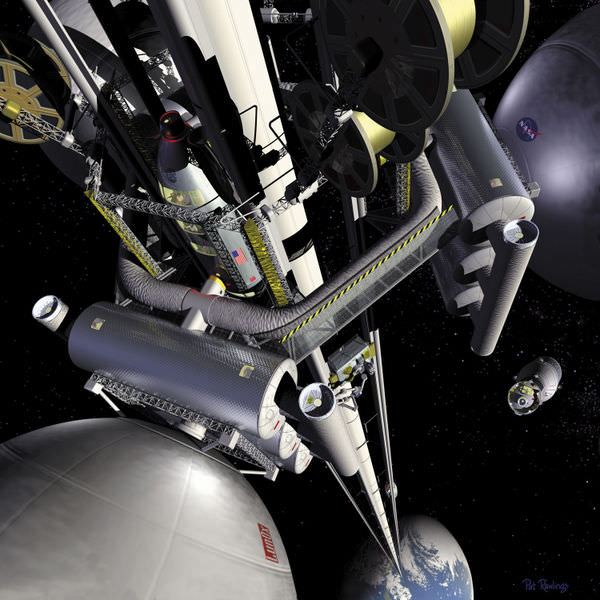All deep space mission proposals like this conveniently ignore the unsolved problems of long term radiation exposure and food supply, among many others.
That’s already a solved problem - the billionaires will simply send us up in waves.
Once we’re at the technological level of mining asteroids, I think food supply and radiation shielding will be comparatively small challenges. Food can be grown wherever there is sunlight, and radiation can be mitigated by placing sufficient matter on the exterior of the habitats.
Do you want Belters? Cause that’s how you get Belters.
Can Elon be the first belter? 5.2B is less than he dropped for Xitter.
Elon is the epitome of an Inner. Holden may have been born in the well, but at least he thought of himself as a Belter and worked towards their interests. Elon would be no more of a Belter than Jules-Pierre Mao. Just because they leave the well doesn’t mean they’re a Belter
tl;dr: lol no way in hell

Ahh ha…
How much is nasa spending to go back to the moon again?
How much fuel and round trips into earth orbit is required just to go to mars again?
DOUBT.jpg
Estimates for Starliner are currently at about $2.5 billion, with multiple test flights. Costs for the first launch of SLS was close to $5 billion. NASA is not where you go to see how little something could cost.
While I kind of agree in principal, you cant compare it to organisations who can only claim hype. So until these “more efficient” corporations prove it, it is just more hype and baseless claims.
The first company with reusable, commercial rocket stages, who will likely have the most space launches of any organization ever, has already done more launches than any other organization per year, and has brought the cost to orbit down by at least one order of magnitude, and you claim hype? I get the hate for Elon, but I think your feelings might be blinding you to easily verifiable facts. Just like the fact that in order to get anything passed, the US space program has to engage in some of the most inefficient manufacturing practices imaginable, which leads to the inflated costs I referred to in my previous comment. Again, easily verifiable facts. After all, whose shoulder did NASA tap on to resolve the problem of some stranded astronauts?
All claims are hype until proven, especially from the hype master himself.
Well this is an insane plan. The most obvious problem being the fuel required to round trip materials collection. Next, there’s how to decelerate the payload into Earth’s atmosphere.
Really, I think the biggest one nobody talks about is: what are the negative effects of adding more mass to Earth over time? If you’re talking about mining an entire dwarf planet and bringing that mass back here, then that would have to have some negative consequences.
Right now, the Earth is losing mass at about 55 000 tons per year. Yes, losing. About 100 000 tons of hydrogen and helium escapes the upper atmosphere, partially offset by roughly 45 000 tons of dust and meteorites getting scooped up along our orbit.
Considering this has been happening for millions of years, I think we’re quite safe from affecting the Earth’s mass and orbit within the span of even centuries.
But it’s much more likely that the majority of material mined and processed in space will not be coming down to Earth. It’s much better put to use in orbital construction, or shallower gravity wells like the Moon and Mars.
You’re entirely right that getting to the rocks, and getting the mined stuff to where it’s actually useful, are gonna be a problem. Maybe we’ll finally get some nuclear thermal engines, cause the shite ISP of chemical rockets is really insufficient for these trips and ain’t no one wanna wait on the gravity assists.
An interesting thought that makes me ask a few questions.
How much of that dwarf planet would be in scope to return? I guess my completely ignorant suspicion is that it would be a small volume of highly valuable minerals, or minerals destined for space anyway.
Also, what about the mass we are moving off world today? Have all of our satellites and rockets and other space bound craft resulted in any measurable change to earths place in the solar system? I would imagine some leave only temporarily, but how much mass do we permanently shed?
I asked the same thing to a panel of JPL nerds years ago, and the answer was basically “We don’t definitively know.” , but some facts I hadn’t thought about came out of it.
-
Earth’s gravity technically doesn’t change by any measurable amount in relation to the sun unless we send mass far enough away to not interact with Earth gravity anymore, and the vast majority of everything we’ve sent up is still in orbit.
-
The distance to the Sun can’t be measured in any effective way directly, so they essentially measure the distance of Earth to thousands of other objects in relation to us and the Sun to come up with a usable number
-
The effective Gravity of Earth can’t be reliably measured before the first instrumented measurements were taken at some point (I can’t find when this was, but early 2000’s I think). They can only tell from the first measurement if there are effective changes.
Knowing all of this, it seems bringing back millions of tons of mass to Earth is going to change SOMETHING.
Scientists say “We don’t know for sure” when they definitively can’t say the odds are zero. “Will flinging satellites out of the solar system change the orbit of the earth, causing it to plunge into the sun.” “We don’t know for sure.” “Will setting off a nuclear bomb ignite the entire atmosphere?” “We don’t know for sure.” “Will running the Large Hadron Collider create strange matter that will annihilate the entire universe?” “We don’t know for sure.” The first question was asked by you, the other two were asked by senior officials at some point in the last 100 years. Even before they were asked, scientists were fairly certain that wouldn’t be the result, but there was some small chance that it could, and scientists generally don’t say “No” unless there is absolutely no chance something will happen.
Well, I think they were talking about the absolute difference between gravity or not of an object. It’s not really subject, we just don’t know at what point that happens because we’ve largely only been working with orbit made.
We lose thousands of tons of mass every year in the form of gases and gain a lesser amount in material from asteroids over the same period. The mass gain appears to have been quite dramatic, back when the earth was formed. Chaos would have reigned for a significant period after that, then we would likely have had a constantly diminishing amount of asteroid impacts. When exactly the earth went from a net annual gain of mass to a net loss is hard to say, but if you were to ask if the mass of the earth-moon system maintained an annual net zero mass change at any point, the answer would probably be “We don’t know for sure.”
-
Not sure you’re aware of just how massive Earth is compared to these smaller bodies, it’s a percentage of a percentage we’re talking about.
It’s not about me…
I wonder how much heat just descending that much mass would generate.
What’s even out there? Dirty water? The same minerals that can be found on earth, just impossibly far and difficult to get?
What does that $5B get you for the trouble? Legislation for space crews, space work, and probably some rare medals like iridium or platinum. What’s most likely expected is weird grade silica and some ferrous metal we already have access to here in decent amounts. It’s not worth it.
The only benefit I can see is if you don’t take anything back down the gravity well. Build up manufacturing directly in space.





